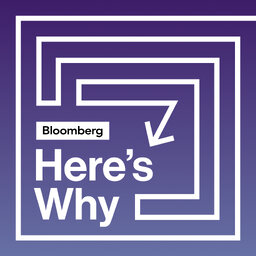Dollar for Your Thoughts
Dollar strength is fast becoming an Achilles heel for global economies, already grappling with geopolitical uncertainty and unmanageable inflation. Sterling’s plunge this week after a stunning HM Treasury announcement added a layer to FX market turmoil. Tom Orlik, Dan Moss and Andreea Papuc join. We also speak with Justin Fox on how labor market participation in the US could help the Fed.
In 1 playlist(s)
Bloomberg Opinion
Deeper conversations on the week's most significant developments. Tune in and join in!Social links
Follow podcast
Recent clips

Introducing 'Here's Why' - Complex News Stories Explained
00:30

Airline Mergers and Restaurant Loyalty
35:20

Fossil Fuel Use and Drug Development
35:28
 Bloomberg Opinion
Bloomberg Opinion